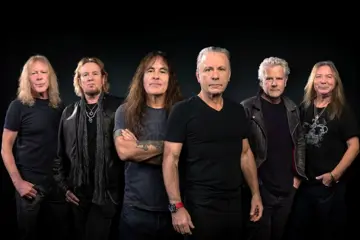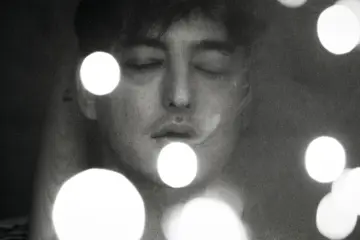 Current Swell
Current SwellCanadian indie-rock/roots four-piece Current Swell unleashed their newest studio album, When To Talk & When To Listen, earlier this month, preceded by anthemic single You Got It Easy.
The full-length was produced by Grammy winner Jacquire King (Kings Of Leon, Norah Jones, Tom Waits, Cold War Kids and more) over four weeks between Nashville and Vancouver. Being their sixth LP in 12 years as a band, it was vital that the members clung fast to the musical values that have won them legions of fans the world over, through periods of triumph and tumult alike.
What they emerged with is, by their own account, one of their strongest releases to date.
"[King] said we had finally tapped into that spark he heard in the very first demos we sent him," frontman Scott Stanton said in a statement. "It helped create trust. He knew as much about the songs as we did. He pushed us because he knew we had it in us to make a really great record."
Stanton and fellow member and songwriter Dave Lang sat down recently to reflect upon the album around its release, and The Music is lucky enough to have been gifted the blow-by-blow of how that all went down. Read the band's track-by-track breakdown, and listen to the LP, below.
1. Marsha
Don't miss a beat with our FREE daily newsletter
Scott: We really wanted to get this song first on the record because it does stand out a little bit as being a song that doesn't have as many epic parts or something like that, but we just really liked how catchy it was right out of the gate and how it was, like, only a two-minute-long song and we really liked the vibe that it set right out of the gate. So that's kind of what we were going for. But the song is about my mom; she passed away when I was in grade nine, so I was 16 or something, and it's basically kind of like… when I go for a walk now with my daughter and I get in an argument with my girlfriend or whatever it is, and I'm just talking something out, but it's kind of like the inner dialogue that I'm having with my mom and kind of like, what would she do?
Anyways, this was happening one day and I came home from my walk and I instantly picked up the guitar and this riff came out of me and the lyrics kind of just fell into place really quickly. It's just one of those songs that I put a drum beat on a loop, and it kind of figured itself out really quickly, and kind of had the song. I showed it to the guys and everyone kind of gravitated towards it in a positive way and made it on the record, which feels really good, and I hope you enjoy.
2. You Got It Easy
Scott: All right, this song, You Got It Easy: every morning Dave and I would get together in the morning and this one day we kind of didn't even know really what to work on, and — we were having coffee in the living room, right?
Dave: Yeah, it was in Scott's living room. It was one of the very first songs we worked on from scratch, and Scott was just like, 'Yeah, I got this riff, and it's...I don't really know what it is,' and before you knew it, we were just kind of back-and-forth-ing and we were kind of getting inspired off… maybe it was like, soul music-type...
Scott: Yeah, pulling from like, Nathaniel Rateliff, almost, just really scream-y choruses, like, gang-y kind of vibe. We were just shouting out this chorus over and over, and it felt so good and fun. I don't think we recorded any of it that day; we just really structured it all out. Then the next day, we went and recorded it upstairs and I remember just… we had the choruses all done and kind of all structured, but then we're like, 'Huh, what's this song about?' [laughs]
Dave: We really love singing this, but… we would kind of compare like, 'What do you think this song's about?' I think we both got the inspiration like, 'Maybe this is like a finger to the chest, like sticking it to someone that's done you wrong,' and maybe that's just something that's universal that everyone else could grab onto that.
Scott: We kind of went back to the drawing board a little bit on lyrics to really make more of a story but, yeah, that's when all the puzzle pieces finally get put in together. That's what makes it a good song.
3. It Ain't Right
Dave: This track was a real pleasure to build. I remember Scott had these four chords and he had a real cool kind of, like, '60s swing thing going on, and we couldn't quite make it a song but we love the chords and all of a sudden we just started playing it fast and with just a kick drum going [imitates kick drum].
Scott: And I remember you were playing guitar and the kit at the same time, so you're playing kick drum and hi-hat and playing guitar and I was on guitar and then...
Dave: And Scott's like, 'Wait, I'm going to plug in this microphone,' and randomly plugged this microphone into an amp and then came up with a real simple melody on the fly, which was perfect.
Scott: And with a surfy kind of like melody and then, yeah, I think we both looked each other like, 'Oh, this feels great!'
Dave: Like this is exactly what we want to do. We just knew we were in the right spot at the right time, but it was the end of the day and we were going to go home and have dinner and relax for the night, and the next day we both came with lyrical ideas and we just sort of got on a roll talking about this guy who kind of does his girlfriend wrong, and his girlfriend's pregnant and he kind of goes out a lot. He eventually chases around some other girl, and I think that takes us to the first verse, and then the second verse it's the...
Scott: It's this girl that he's after, and she's on this bicycle and he's just like, 'Oh my god, this girl's perfect for me,' and she's like, 'Oh, no, I'm moving into the big city, I'm going to be an actress, I'm gonna be amazing.' So she moves away, and now he's all bummed out. The third verse then comes in, and he goes to surprise her and chases her down, he goes to visit her and she's like, 'No, no, no, I've moved on.' So it's kind of, like, what goes around, comes around, was the moral of the story in this one.
Dave: There's this moment in the third verse, I love it, it goes… so he meets up with the girl, who's moved away, and she's kind enough to invite him, or something, and there's this line that goes, 'She took you out but were you surprised that her friends loved to talk but they wouldn't look you the eyes?' and there's just this feeling, everyone's had something like that, where you're like, 'What did they know that I didn't know?' And a lot of the song was trying to find those little moments of visualisation on that sinking feeling and 'what goes around, comes around'. I think this guy gets it in the end.
Scott: Yeah. He got what he deserved.
4. When to Talk and When to Listen
Dave: We did name the record after [this song], but there's no main reason why; it just was a good song. I feel like it rolls off the tongue and, anyways, the song basically was inspired by this feeling that I was having when my wife was pregnant with our first child, and her dad had about a month left to live. So it was a real sort of crossroads of emotion in life where I was looking at that concept of time slipping away, and just really thinking about, 'Well, what might he want to tell his granddaughter? He's never going to see her, what might he want to tell her?' And then I thought, 'What if something happened to me, if I was in his position, what would I wanna pass along?'
That thought inspired the idea of how you might give advice; when's a good time to talk, and when's a good time to listen? When do you wanna run from something, when do you wanna stay and fight it out? It just made for a good inspiration to get going and then we built this really cool, dreamy first half of the song. I then came to Scott with a bit of this first half kind of roughed out, but it was only about a minute long. And then I remember we started just, like, Scott starting messing around with this bridge to take us into a new part that had a bit of that feel of It Ain't Right, like a bit of that pulse-y, surfy feel.
Scott: More surfy kind of guitars again, and… which we were really feeling, so somehow we kind of transition out of the dream sequence into more of a fun song. The song's not too sombre or anything, and it ends with a real anthemic feel, which I really love. I think one of the coolest sort of secret parts about this song that I'm stoked to share with you guys is… the song starts with this melody [sings]. I remember when we were recording the song Young & Able, I was trying to come up with a melody to... and of course that song's in a different key, but a melody to put in as a solo piece. It didn't get used during Young & Able but, years later, as I was working on this song, it was like, 'Oh, I could use that same melody!' And it was so cool to get to put some piano on it, and get it to shine just the way I imagined it could.
5. Woman in White
Dave: This is an interesting one for a couple reasons. First, it took a big U-turn in terms of what it was about. Originally, it was kind of an anti-love song about two young people that were very much in love when they were kids and drifted apart, and turned into just two people that loved each other that they'd do anything to be with each other, run away from their families. But it also was interesting too, because on our last record we wrote a song called Bang Bang Wedding, and the first thing I wrote in this song was the chorus, it was basically just this really long chorus and it had this part in it that goes, "Bang, bang, woman in white," and everyone's like, 'Oh, so you rewrote Bang Bang Wedding?' It's like, well, no, we didn't use it last time so we thought it was catchy and wanted to use it this time. That's how it all kind of came together: a lot of pieces from all over the place that I kind of had to pull to finish the puzzle, and [I'm] glad it worked out and people liked it.
6. Staying Up All Night
Dave: So this song was… I kept kind of getting struck when… working on the chorus, just that feeling of being like, maybe 17 or 18, and when you find that first love or something and it drives you crazy; maybe you don't know if you're actually in love. But there's this feeling that I remember having — being in maybe my late teens, early 20s — of just… show me a hint of love and I'll fall for it, like flat out. You just stay up all night doing crazy things, like, you would do anything for just a few more minutes of that life and that time and how important everything was at that time.
It's so neat because everything sort of changes... But if you're like me, I'm in my early 30s and happily married, and I can look back at those times, but there's nothing like that feeling of just crazy, crazy in love. So Scott and I kind of put together kind of… verse, chorus thing and then I had this bridge I worked in I was pretty stoked about, and then we kind of finish and we're like, 'Oh, this song's only like two minutes long, wouldn't it be sweet if something cool happened?' And we just couldn't figure it out. Then one day Scott just was like, 'It would be cool if there was a sort of Arcade Fire-esque [sings], and kind of playing along or something.' We pieced together the chords for this part, I think it's one of my favorite parts in the record, the whole outro instrumental to this. Because it's just got this dance-y...
Scott: Yeah, it's got this sweet driving… and it's just a nice, extra-cool part, I think. The song was great and then we just kind of put this nice little great part at the end of it and yeah... It's super fun to play, feels good.
Dave: Yeah, it's sweet. I got to play this 1945 Martin acoustic guitar at Blackbird Studios; they were just like, 'Go ahead, play this, it'll sound great.' I was like, 'This must be a $60,000 guitar.' It looked like it should have been in a museum. And I was just playing it and was like, feeling real good. And then there's another cool part in the end at the outro where you hear a horn, kind of arpeggiating horn, come in, where I was like, 'Oh, this would be sweet,' and got our trumpet player, Phil, and was like 'Oh, can you play this?' He's like, 'You can't… arpeggiate that fast on a trumpet.' And we were like, 'OK, well, play this half, just play it at whatever speed you're comfortable with and we'll just speed up the tape and...'' it was pretty cool. So there's a little bit of that on this song because with an outro — this is my favorite part of the song — with an outro, there's no rules; you can just hammer on the layers. This song was never destined for radio or anything so I think we just really enjoyed just having fun on this one.
7. Use Me Like You Do
Scott: We spent quite a lot of time in the music department on this song, and we kind of got carried away having fun with reverse pianos and all these other random things. It was interesting, we got into this point where we thought, 'Oh my god, this song's amazing,' we love the way it sounded, sounded really big and epic and they were like, 'OK, let's work on lyrics tomorrow.' We thought, 'Oh, lyrics will be a breeze,' and then it's like famous last words: we got in and were like, 'Oh, I don't know.'
We just kind of used the technique where you just… we didn't know what to write about, we were almost kind of freestyling and like, 'OK, you freestyle,' and 'Ooh, I like that word,' or 'Oh, I like those lines,' and slowly piece together a story of either us leaving our partners a lot, worrying if they'll resent us for it or … kind of like that dynamic of people in bands that have relationships kind of go through and that's where we ended up with the whole story behind this song.
8. Thief of Joy
Scott: This song is literally just verse, chorus, verse, chorus and a bunch of screaming. We kind of just got really, like, old-school punk-rock with it, almost; we just really wanted to rock out. We didn't think it was going to make the record, to be honest. Lyrically, it almost kind of stemmed from a just… my favourite quote of the year is by Teddy Roosevelt: 'Comparison is the thief of joy.' I can't remember where I heard it, or where I read it; I was just like, 'Ah, it's so true,' you know? Like, why compare yourself to other people and what other people have? You're just going to beat yourself up over it. Like, why not just be grateful for what you have? Everyone's already so lucky and you're like, "Well, they got a new Lexus," or whatever, and it just makes me sick. So it's basically what this whole song's about, and yeah. It's a screamer.
Dave: It's really good.
9. Like I Fight For You
Scott: This is a song where we kind of just had a riff and a little bit of a melody and first verse. To be honest, I don't think we finished writing this song until we were literally in the studio.
Dave: Yeah it was kind of one that… this is catchy, it feels good, and then we got some advice and passed it to our management and our label and producer, and we're like, 'What song should we put on this record? Here's 15, what 10 do you think?' and everyone was like, 'You gotta put Like I Fight For You on it!' We were like… 'Oh, geez, people like this one [laughs], we might need some lyrics for this one.' It was definitely finished, like, day-of.
Scott: Yeah, I don't think we were too invested in it; maybe it was such an old song of ours that we were working on much newer material that we were, like, more in love with, and thought was cooler and newer and fresher, and so when it came to this one, management and everyone's like, 'You should put this one on!' We were like 'Ugh, really?' But we hope you like it. Listeners out there, I hope you guys like it. [laughs]
10. The Time and the Weight
Dave: I love the title of this. This would have made a good title for the album, I think.
Scott: You betcha.
Dave: Should've done that. Damn! This one, a lot of what I was writing about and inspired about was just that fleeting concept of time that we all structure our whole lives around. Everything is moving faster and faster and faster, basically. It kept coming out and in every song I'd be saying something about time. Something I mentioned in When To Talk, When To Listen, with my father-in-law passing away or having a baby and going into the studio and making a new record, it was like everything, especially in band life, is on the clock. You know what you're doing for the next year, every single day.
Every day that passes, I get a little bit older and I start thinking more about the time that we got left, and the time that's just racing away from us. Not to get too heavy, but that kept coming up when I'd be trying to write a song. So this one, I think Scott and I worked on the chorus together, and it just felt really good to take a little bit of responsibility for the weight of all that time, and it's on me, on us. If we don't get our choices right, we kind of gotta pay for 'em, and I like that. I like when the band plays it together and everyone sings along in the chorus and it feels real good. I think that's maybe a good song to end the record with because four guys sitting around, singing the song, feels just like a band should be.
Scott: Totally.
11. Marsha (Slow Reprise)
Scott: All right, the extra or the outro or… we started with Marsha so it was kind of cool...we were basically in the studio when the engineer was playing Marsha in slow motion because I was redoing the vocals for some reason, and we were just like, 'Whoa, this sounds awesome!' We thought it just sounded super-cool and were like, 'Where could we use that?' At the end of the day, we just got a snippet of it because we thought it sounded cool and sometimes you can just be like, 'This sounds cool, we want to put it somewhere on the album,' and that's what we did.
Dave: Yeah, we thought like, 'Wouldn't it be cool if the vinyl ended with the reprise going out and the record sort of… the needle just takes away and you flip the record over and it's that cool intro.' The start of Marsha has that reverse thing for just a couple seconds, that would sound so cool next to each other. So that's what we did.
















